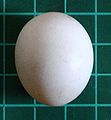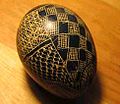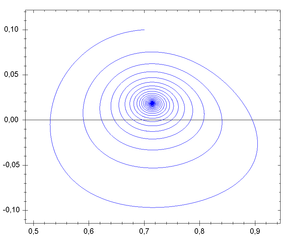
Body without organs
Encyclopedia
Gilles Deleuze
introduced the notion of the "Body without Organs" (or "BwO") in The Logic of Sense
(1969); but it was not until his collaborative work with Félix Guattari
(particularly Anti-Oedipus [1972] and A Thousand Plateaus
[1980]) that the BwO comes to prominence as one of Deleuze's major ideas.
The term is borrowed from Antonin Artaud
's radio play "To Have Done with the Judgment of God" (1947):


 In Deleuze's work, the term initially refers to the "virtual" dimension of the body. In Anti-Oedipus they say:
In Deleuze's work, the term initially refers to the "virtual" dimension of the body. In Anti-Oedipus they say:
For Deleuze and Guattari, every "actual" body has (or expresses) a set of traits, habits, movements, affects, etc. But every "actual" body also has a "virtual" dimension, a vast reservoir of potential traits, connections, affects, movements, etc. (a phase space
). This collection of potentials is what Deleuze calls the BwO. To "make oneself a body without organs," then, is to actively experiment with oneself to draw out and activate these virtual potentials. These potentials are mostly activated (or "actualized") through conjunctions with other bodies (or BwOs) that Deleuze calls "becomings."
Deleuze and Guattari use the term BwO in an extended sense, to refer to the virtual dimension of reality in general (which they more often call "plane of consistency" or "plane of immanence
"). In this sense, they speak of a BwO of "the earth." "The Earth," they write, "is a body without organs. This body without organs is permeated by unformed, unstable matters, by flows in all directions, by free intensities or nomadic singularities, by mad or transitory particles" (A Thousand Plateaus
, p. 40). That is, we usually think of the world as composed of relatively stable entities ("bodies," beings). But these bodies are really composed of sets of flows moving at various speeds (rocks and mountains as very slow-moving flows; living things as flows of biological material through developmental systems; language as flows of information, words, etc.). This fluid substratum is what Deleuze calls the BwO in a general sense.
In A Thousand Plateaus
, Deleuze and Guattari eventually differentiate between three kinds of BwO: cancerous, empty, and full. Roughly, the empty BwO is the BwO of Anti-Oedipus. This BwO is also described as "catatonic" because it is completely de-organ-ized; all flows pass through it freely, with no stopping, and no directing. Even though any form of desire can be produced on it, the empty BwO is non-productive. The full BwO is the healthy BwO; it is productive, but not petrified in its organ-ization. The cancerous BwO is caught in a pattern of endless reproduction of the self-same pattern. They give, thus, a rough recipe for building for yourself a healthy BwO:
Gilles Deleuze
Gilles Deleuze , was a French philosopher who, from the early 1960s until his death, wrote influentially on philosophy, literature, film, and fine art. His most popular works were the two volumes of Capitalism and Schizophrenia: Anti-Oedipus and A Thousand Plateaus , both co-written with Félix...
introduced the notion of the "Body without Organs" (or "BwO") in The Logic of Sense
The Logic of Sense
The Logic of Sense , a book released by the French philosopher Gilles Deleuze in 1969, is an exploration of meaning and meaninglessness, or "commonsense" and "nonsense"...
(1969); but it was not until his collaborative work with Félix Guattari
Félix Guattari
Pierre-Félix Guattari was a French militant, an institutional psychotherapist, philosopher, and semiotician; he founded both schizoanalysis and ecosophy...
(particularly Anti-Oedipus [1972] and A Thousand Plateaus
A Thousand Plateaus
A Thousand Plateaus is the second book of Capitalism and Schizophrenia, the first being Anti-Oedipus. Written by Gilles Deleuze and Félix Guattari, it was translated into English by Brian Massumi...
[1980]) that the BwO comes to prominence as one of Deleuze's major ideas.
The term is borrowed from Antonin Artaud
Antonin Artaud
Antoine Marie Joseph Artaud, more well-known as Antonin Artaud was a French playwright, poet, actor and theatre director...
's radio play "To Have Done with the Judgment of God" (1947):
When you will have made him a body without organs,
then you will have delivered him from all his automatic reactions
and restored him to his true freedom.



The body without organs is an egg: it is crisscrossed with axes and thresholds, with latitudes and longitudes and geodesic lines, traversed by gradients marking the transitions and the becomings, the destinations of the subject developing along these particular vectors.
For Deleuze and Guattari, every "actual" body has (or expresses) a set of traits, habits, movements, affects, etc. But every "actual" body also has a "virtual" dimension, a vast reservoir of potential traits, connections, affects, movements, etc. (a phase space
Phase space
In mathematics and physics, a phase space, introduced by Willard Gibbs in 1901, is a space in which all possible states of a system are represented, with each possible state of the system corresponding to one unique point in the phase space...
). This collection of potentials is what Deleuze calls the BwO. To "make oneself a body without organs," then, is to actively experiment with oneself to draw out and activate these virtual potentials. These potentials are mostly activated (or "actualized") through conjunctions with other bodies (or BwOs) that Deleuze calls "becomings."
Deleuze and Guattari use the term BwO in an extended sense, to refer to the virtual dimension of reality in general (which they more often call "plane of consistency" or "plane of immanence
Plane of immanence
Plane of immanence is a founding concept in the metaphysics or ontology of French philosopher Gilles Deleuze. Immanence, meaning "existing or remaining within" generally offers a relative opposition to transcendence, a divine or metaphysical beyond or outside...
"). In this sense, they speak of a BwO of "the earth." "The Earth," they write, "is a body without organs. This body without organs is permeated by unformed, unstable matters, by flows in all directions, by free intensities or nomadic singularities, by mad or transitory particles" (A Thousand Plateaus
A Thousand Plateaus
A Thousand Plateaus is the second book of Capitalism and Schizophrenia, the first being Anti-Oedipus. Written by Gilles Deleuze and Félix Guattari, it was translated into English by Brian Massumi...
, p. 40). That is, we usually think of the world as composed of relatively stable entities ("bodies," beings). But these bodies are really composed of sets of flows moving at various speeds (rocks and mountains as very slow-moving flows; living things as flows of biological material through developmental systems; language as flows of information, words, etc.). This fluid substratum is what Deleuze calls the BwO in a general sense.
In A Thousand Plateaus
A Thousand Plateaus
A Thousand Plateaus is the second book of Capitalism and Schizophrenia, the first being Anti-Oedipus. Written by Gilles Deleuze and Félix Guattari, it was translated into English by Brian Massumi...
, Deleuze and Guattari eventually differentiate between three kinds of BwO: cancerous, empty, and full. Roughly, the empty BwO is the BwO of Anti-Oedipus. This BwO is also described as "catatonic" because it is completely de-organ-ized; all flows pass through it freely, with no stopping, and no directing. Even though any form of desire can be produced on it, the empty BwO is non-productive. The full BwO is the healthy BwO; it is productive, but not petrified in its organ-ization. The cancerous BwO is caught in a pattern of endless reproduction of the self-same pattern. They give, thus, a rough recipe for building for yourself a healthy BwO:
This is how it should be done. Lodge yourself on a stratum, experiment with the opportunities it offers find an advantageous place on it, find potential movements of deterritorialization, possible lines of flight, experience them, produce flow conjunctions here and there, try out continua of intensities segment by segment, have a small plot of new land at all times. It is through a meticulous relation with the strata that one succeeds in freeing lines of flight, causing conjugated flows to pass and escape and bringing forth continuous intensities for a BwO.
Sources
- Deleuze, GillesGilles DeleuzeGilles Deleuze , was a French philosopher who, from the early 1960s until his death, wrote influentially on philosophy, literature, film, and fine art. His most popular works were the two volumes of Capitalism and Schizophrenia: Anti-Oedipus and A Thousand Plateaus , both co-written with Félix...
and Félix GuattariFélix GuattariPierre-Félix Guattari was a French militant, an institutional psychotherapist, philosopher, and semiotician; he founded both schizoanalysis and ecosophy...
. 1972. Anti-ŒdipusAnti-ŒdipusAnti-Oedipus is a book by the French philosopher Gilles Deleuze and the psychoanalyst Félix Guattari. It is the first volume of Capitalism and Schizophrenia, the second being A Thousand Plateaus ....
. Trans. Robert Hurley, Mark Seem and Helen R. Lane. London and New York: Continuum, 2004. Vol. 1 of Capitalism and SchizophreniaCapitalism and SchizophreniaCapitalism and Schizophrenia is a two-volume theoretical work by the French authors Gilles Deleuze and Félix Guattari. Its volumes, published eight years apart, are Anti-Oedipus and A Thousand Plateaus ....
. 2 vols. 1972-1980. Trans. of L'Anti-Oedipe. Paris: Les Editions de Minuit. ISBN 0826476953. - ---. 1975. Kafka: Towards a Minor Literature. Trans. Dana Polan. Theory and History of Literature 30. Minneapolis and London: U of Minnesota P, 1986. Trans. of Kafka: Pour une litterature mineure. Paris: Les Editions de Minuit. ISBN 0816615152.
- ---. 1980. A Thousand PlateausA Thousand PlateausA Thousand Plateaus is the second book of Capitalism and Schizophrenia, the first being Anti-Oedipus. Written by Gilles Deleuze and Félix Guattari, it was translated into English by Brian Massumi...
. Trans. Brian MassumiBrian MassumiBrian Massumi is a Canadian political philosopher and social theorist. Massumi's research spans the fields of art, architecture, political theory, cultural studies and philosophy. He received his Ph.D in French Literature from Yale University in 1987...
. London and New York: Continuum, 2004. Vol. 2 of Capitalism and SchizophreniaCapitalism and SchizophreniaCapitalism and Schizophrenia is a two-volume theoretical work by the French authors Gilles Deleuze and Félix Guattari. Its volumes, published eight years apart, are Anti-Oedipus and A Thousand Plateaus ....
. 2 vols. 1972-1980. Trans. of Mille Plateaux. Paris: Les Editions de Minuit. ISBN 0826476945. - Guattari, FélixFélix GuattariPierre-Félix Guattari was a French militant, an institutional psychotherapist, philosopher, and semiotician; he founded both schizoanalysis and ecosophy...
. 1984. Molecular Revolution: Psychiatry and Politics. Trans. Rosemary Sheed. Harmondsworth: Penguin. ISBN 0140551603. - ---. 1992. Chaosmosis: An Ethico-Aesthetic Paradigm. Trans. Paul Bains and Julian Pefanis. Bloomington and Indianapolis: Indiana UP, 1995. Trans. of Chaosmose. Paris: Editions Galilee. ISBN 0909952256.
- ---. 1995. Chaosophy. Ed. Sylvère Lotringer. Semiotext(e) Foreign Agents Ser. New York: Semiotext(e). ISBN 1570270198.
- ---. 1996. Soft Subversions. Ed. Sylvère Lotringer. Trans. David L. Sweet and Chet Wiener. Semiotext(e) Foreign Agents Ser. New York: Semiotext(e). ISBN 1570270309.
- Massumi, BrianBrian MassumiBrian Massumi is a Canadian political philosopher and social theorist. Massumi's research spans the fields of art, architecture, political theory, cultural studies and philosophy. He received his Ph.D in French Literature from Yale University in 1987...
. 1992. A User's Guide to Capitalism and Schizophrenia: Deviations from Deleuze and Guattari. Swerve editions. Cambridge, USA and London: MIT. ISBN 0262631431.

